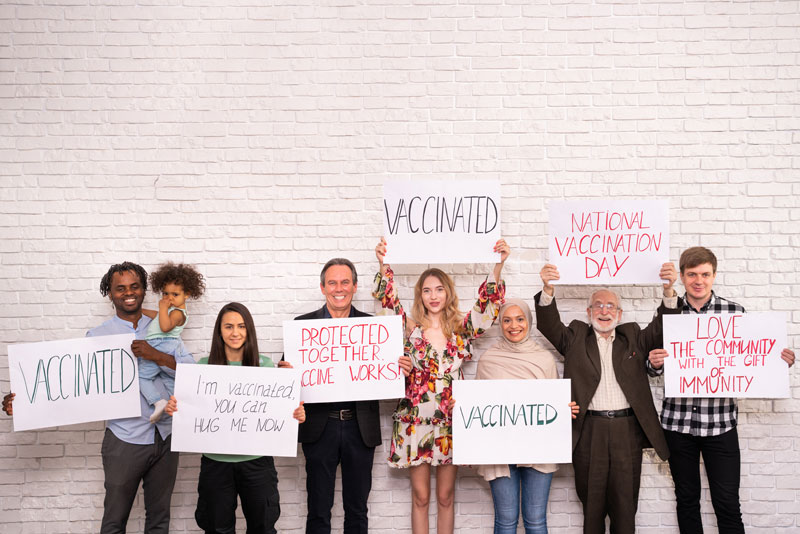Herd Immunity and Vaccinations

How can we effectively limit the spread and gain control of infectious diseases?
What is Herd Immunity?
Herd immunity occurs when a significant portion of a population becomes immune to an infectious disease, limiting disease spread. When there are limits on the spread of the disease, even those not already immune have a reduced risk of exposure.
Reducing the risk of disease spread is especially critical in protecting individuals who can’t be vaccinated. These would include newborns, those with compromised immune systems, and those who cannot tolerate the vaccine.
How might Herd Immunity be achieved?
Vaccines are one way to work toward herd immunity. Vaccines help the body’s immune system to protect itself against specific diseases.
A population can also achieve herd immunity when its members become ill and survive infection from a disease. However, according to the World Health Organization, “Attempts to reach herd immunity through exposing people to a virus are scientifically problematic and morally unethical.”
As recent history has taught us, the uncontrolled spread of a virus through populations and across nations can result in uncontrollable surges of unnecessary infections and deaths.
Vaccines are not always 100% effective, but they remain the safest and most predictable way to work toward herd immunity.
Challenges to achieving Herd Immunity
To achieve herd immunity against any infectious disease, a substantial percentage of a population needs to be vaccinated or have recovered from the disease. This hinders the ability of the virus to grow and spread.
Vaccines have successfully controlled contagious diseases such as smallpox, diphtheria, rubella, polio, etc. However, not all infectious diseases are equal when achieving herd immunity.
For example, most health experts agree that an estimated 95% of a population would need to be vaccinated to achieve herd immunity to measles. This estimate also means the remaining 5% have some degree of protection. Subsequently, at 95% coverage, the measles virus would have limited ability to find new hosts and continue to spread.
Can we achieve Herd Immunity with COVID-19?
Despite estimates, there is no substantial agreement among professionals on the population percentage that must be vaccinated against COVID-19 to achieve herd immunity. Additionally, the vaccination rate in the U.S. has slowed, and more COVID-19 virus variants have begun to develop and circulate.
According to Ellen Foxman, MD, Ph.D., a Yale School of Medicine Pathologist, “We need to get vaccinated as soon as possible to prevent the spread of COVID-19, which will also prevent the emergence of variants.” As she summarized, “It’s a race between vaccinations and variants.”
Increased vaccinations are the key
Vaccines are unquestionably one of the most efficient and effective methods of protecting people from communicable diseases and deaths.
As the United States and the world continue to work toward minimizing the spread of vaccine-preventable diseases, all individuals must do their part and remain vigilant about their health and immunity.
Your best chance of living a healthy, disease-free life begins with you. Take control of your health by being informed regarding your health conditions and risk of illness. Speak with your medical provider about vaccines that may benefit your well-being.
If you cannot tolerate vaccines, speak with a medical provider or seek reliable information sources such as the CDC for alternative methods to reduce your risk of contracting communicable diseases.
If you have questions about specific vaccines or how to obtain a vaccine, contact your medical provider or contact the Moultrie County Health Department (MCHD). Our office can assist you with accessing vaccines for children and adults.
Vaccine appointments are available Monday through Friday for residents and visitors of Moultrie county. The MCHD accepts most medical insurance plans, including Medicare and Medicaid.

